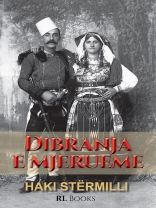Ky ribotim i trilogjisë dramatike të Stërmillit nis me dramën historike me katër akte ‘Dibranja e mjerueme’, subjekti i së cilës janë ngjarjet e zhvilluara në Dibër, Manastir, Mat dhe në fshatrat e këtyre qyteteve në vitet 1912 dhe 1913. Nga shënimet e autorit në botimin e parë mësohet se, kur po shkruante ‘Dibranja e mjerueme’, Stërmilli kishte në dorëshkrim edhe dy dramat e tjera: ‘Dashuni e besnikëri’ dhe ‘Agimi i lumnueshëm’ ose të paktën kish nisur punën për to. Kjo trilogji, sipas Stërmillit, hedh dritë ‘në ngjarjet e vërteta qi kanë ngja në kohën e fundit…’. Autori u sugjeron lexuesve ‘që dëshirojnë të kenë një kuptim të plotë mbi lëvizjet kombëtare të Dibrës, duhet të këndojnë edhe dramën ‘Dashuni e besnikëri’ dhe ‘Agimi i lumnueshëm”, që në atë kohë ende nuk ishin botuar.
表中的内容
Dibranja e mjerueme
Dashuni e besnikëri
Agimi i lumnueshëm
关于作者
Haki Stërmilli (17 May 1895 – 17 January 1953) was an Albanian writer and journalist. His works dealt mostly with issues related to the rights of Albanian communities outside Albania, republicanism, the emancipation of women and feminism. His best-known work is the novel Sikur të isha djalë (English: If I were a Boy).Life Born in Debar, Ottoman Empire (modern North Macedonia), Stërmilli finished his first studies in Bitola. In 1920 along with Avni Rustemi he became one of the founders and the secretary of the youth organization Bashkimi. An anti-monarchist and supporter of Fan Noli he took part in the revolt that overthrew the monarchy, but after its restoration in late 1924 he was exiled. In 1930 he was captured by the Yugoslav authorities and deported to Albania, where he was sentenced to prison for his anti-monarchist activities. During World War II he joined the National Liberation Movement (LNÇ) and became head of the organization in the Dibër District. After the war he was elected a deputy of the Albanian parliament and also served as head of the National Library of Albania until his death in 1953.












